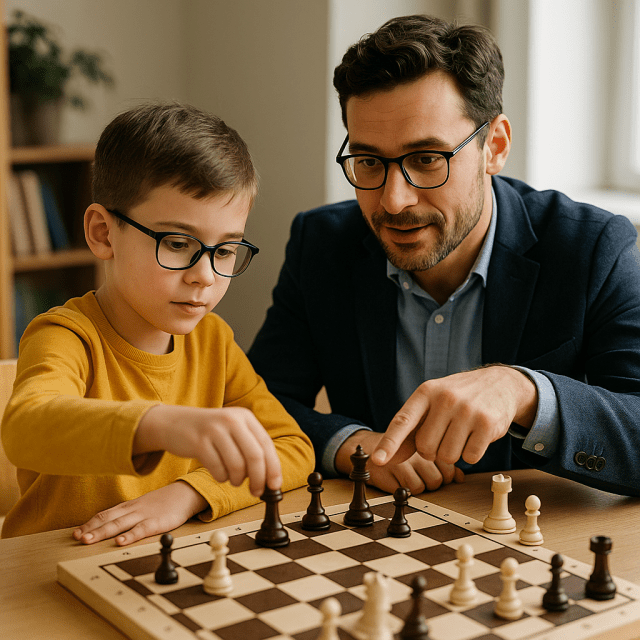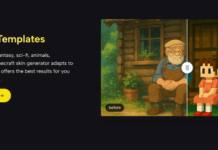
Chess isn’t just a board game: It’s an exercise of the mind, an experience that teaches children how to think and act smarter, build character, and develop stronger self-esteem. And while there were books and online tutorials, nothing quite compares with the personal impact a great chess coach can have on a child’s life. Let’s examine the special place a chess coach can hold in the life of a child and when it might be time to add a grandmaster to your rotation.
Chess Coach: What is Their Role in a Child’s Life
A great chess coach delivers more than instruction on how to castle or memorize opening lines. They are teachers leading children through intellectual and emotional development. A good coach establishes an organized learning environment in which achievement is quantifiable and gratifying.
Children are curious by nature, but they frequently don’t have discipline. A coach provides structure, creating a framework of predetermined routines, specific exercises, as well as assessments. This kind of support helps ensure the child will form habitual patterns that foster both chess success and personal development.
Coaches are also emotional supports. Children can be fragile after losses or tough games. A great coach doesn’t just instruct but listens to players, motivates them, and helps them come back stronger. They normalize failure as a learning tool and encourage reflection instead of reaction.
When Do You Need a Grandmaster Chess Coach?
Hiring a coach at the grandmaster level is a major step and should not be done too early. The best way for beginners to learn is from foundational coaches. These coaches concentrate on basics, board vision, and making the game enjoyable.
Parents would be well advised to consider grandmaster-level training for children who are playing in rated tournaments and performing well, have a deep interest, and are willing to work very hard. Most children are ready between ages 10–13, although some exceptionally gifted kids may be ready earlier.
A GM adds profound positional comprehension, opening repertoire development, and analysis of tournament psychology at an elite level. But their techniques can be intimidating. This is why it requires a child who already has maturity, discipline, and a strong desire to improve.
Why Every Young Chess Player Deserves a Coach
Not that talent doesn’t matter, but it has to be cultivated in a properly-executing educational system. A coach enables kids to:
- Sidestep common mistakes
- Progress faster as they receive focused feedback
- Stay motivated and goal-oriented
- Develop game analysis skills
- Prepare strategically for tournaments
Without a coach, many talented young players stagnate early, frustrated by slow progress or tactical confusion.
Benefits Beyond the Chessboard
A chess coach’s impact extends beyond the board. Their lessons seep into academics, friendships, and even family life. Memory, critical thinking, and concentration are enhanced by chess. Children coached regularly often:
- Show improved academic performance
- Become better problem-solvers
- Display increased self-confidence
- Communicate ideas more clearly
Chess also promotes patience — a virtue few have in today’s fast-paced world.
How to Develop Competitive Chess Skills in Young Players
Coaches teach more than just moves — they teach mindset. By training a child in opening preparation, tactical puzzles, and positional exercises, they help develop confidence. Game reviews and loss analysis are also a big part of improvement.
Coaches create tournament conditions to get children used to time pressure and other psychological demands. They teach students to think deeply, calculate quickly, anticipate opponents’ ideas, and maintain composure when the clock is ticking.
Online Chess Coaches vs. In-Person Coaching
Both formats have benefits. Online coaching is convenient and allows access to global talent, whereas in-person training often develops a more personal relationship.
Younger children may benefit more from in-person coaching, while older or more disciplined kids can succeed in a virtual setting. The key is clear communication, regardless of the medium.
Parental Involvement in Coaching Success
Parents play a crucial role. And it also doesn’t have to be fellow chess players in the circle. Supporting an enthusiastic attitude, combining training with fun and showing interest in improvement are all strategies to motivate children.
Too much, on the other hand — constantly critiquing every game or pushing the child hard after losses — can result in burnout. It’s all about trusting the coach and enjoying the learning experience.
Chess Coaching and Emotional Intelligence
A great coach will teach emotional intelligence. Kids learn how to handle stress, remain calm under time pressure and lose without imploding. These are skills that serve them at school, on the field and especially in peer interactions. When you teach children to be gracious when they lose or humble when they win, you are teaching them to become better players and also, more importantly, better people.
True Stories: The Difference a Coach Can Make
Many of the world’s best players thank their early coaches not just for technical instruction but for instilling self-confidence, grit, and vision for the future. Even kids who never go pro but work with a private coach typically show better academic performance, more emotional control, and a lifelong love of learning.
Conclusion
The chess coach adds something to a child’s life that is much more than checkmates and tournament successes. It is about character building and analytical thinking, confidence building. Whether your child dreams of becoming a grandmaster or just wants to have fun playing chess, being coached by someone with experience can make his or her personal story in the game ínto something much deeper and personally meaningful than what shows up on the board. And if your kid shows unusual talent, you might want to bring in a grandmaster when they’re maybe 10–13, at an age where they are mentally prepared to learn from somebody at such a high level. So in the meantime, let them explore and play — and grow as children should.
FAQs
What are the main qualities of a good chess coach for kids?
Patience, communication skills, and deep game knowledge — applied at a pace suitable for children’s learning — are essential.
How frequently should a child take chess lessons?
For beginners, 1–2 meetings per week are sufficient. Higher-level players might need coaching more often.
Is online chess coaching good for kids?
Yes, especially for older kids. High-quality online instruction is available from many platforms and grandmasters.
Can the game of chess improve school performance?
Absolutely. Chess helps improve focus, problem-solving skills, memory, and time management — all of which are beneficial in the classroom.
How do I know if my child is ready for a grandmaster coach?
If they are winning tournaments, practice consistently, and are seeking higher-level training, then a grandmaster might be appropriate.
What matters more: talent or training?
Training. Even the most talented kids require regular, systematic coaching to achieve their potential.




![7 Quick Ways to Transfer Data to a New Phone [Android or iPhone] phone to phone transfer](https://www.jguru.com/wp-content/uploads/2026/01/word-image-116310-1-e1768996905264-100x70.jpeg)



